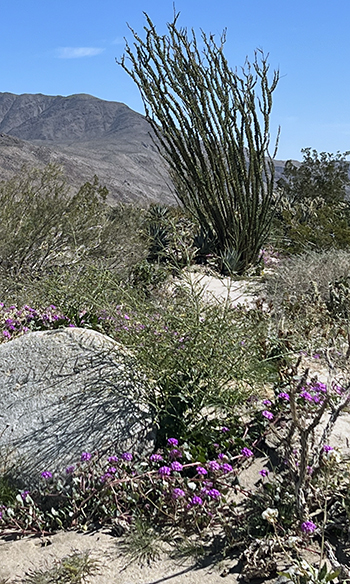By Donald H. Harrison


ANZA BORREGO DESERT STATE PARK, California — The tall ocotillo plant (Fouquieria splendens) that abounds in the Anza-Borrego Desert State Park has many common names, among them, according to Wikipedia and the Britannica website, “coachwhip” and “vine cactus.” Perhaps its most mysterious nickname is one that may or may not tell a Jewish story, “Jacob’s staff.”
Notwithstanding its inclusion in the respected encyclopedias, the nickname “Jacob’s staff” for the ocotillo was unknown to the folks at the Anza-Borrego Desert State Park Visitors Center, as well as to Diana Lindsay, author of the guidebook Anza-Borrego Desert Region; James W. Cornett, author of Wildflowers of Anza-Borrego; and John Malpas of Calflora up at UC Berkeley.
“I’m not sure where that name came from,” commented Malpas. “I have not seen a direct reference to this,” Lindsay said. “I have never heard the name Jacob’s staff … applied to the ocotillo or any other plant species for that matter,” Cornett wrote back after Lindsay forwarded my inquiry to him.
“There is an ephemeral mountain wildflower called Jacob’s Ladder that is found in the Wasatch Mountains,” Cornett continued. “Every botanist I know uses the common name ocotillo, if not the scientific name. Yes, I have heard plenty of other names used for the plant. I almost never talk or write about alternative common names for plants and animals because it just perpetuates confusion. Most common names are created locally and are meaningless elsewhere. I wish I could put to bed banter about on-the-spot common names someone heard an old miner say.”
“Ocotillo” translates from Spanish to “little torch” because of the red flowers that grow at the end of its branches.
I made inquiries about the etymology of “Jacob’s staff” after my wife Nancy and friends Ben and Robin Dishman enjoyed a recent visit to Anza-Borrego. We also ate lunch in the adjoining town of Borrego Springs at the Red Ocotillo, an indoor/outdoor restaurant owned by David Leibert and Cindy Wood, who are the innkeepers of the nearby Palms at Indian Head.
The Biblical patriarch Jacob used a staff to cross the River Jordan. Genesis 32:11 as translated in the ArtScroll Tanach reads: “I have been diminished by all the kindnesses and by all the truth that You have done Your servant; for with my staff I crossed this Jordan and now I have become two camps.”
This confession to God occurs after Jacob leaves the lodgings of his father-in-law Laban to return to his own home. He fears that his brother Esau will take vengeance on him for stealing his birthright many years earlier. So, to assure that his entire line would not be wiped out, Jacob divides his entourage in half, figuring if Esau attacks one group, those in the other can survive. Happily for Jacob, Esau doesn’t want to fight; he wants to reconcile with his twin brother.
It’s possible that some poetic naturalist noted that the ocotillo has many long thin branches, called “canes,” which can grow 8 to 20 feet tall. Wikipedia reports that the ocotillo canes have been used as walking sticks. Perhaps a Bible-quoting naturalist figured that a similar walking stick might have helped Jacob to ford the River Jordan. I’m a bit dubious that the whip-like canes of the ocotillo would have been of much assistance to the patriarch as he crossed the River Jordan, but that’s just my speculation. My friend Ben suggested the plant just as easily might have been named after some 19th century southwestern desert habitué whose first name was Jacob. That, too, is a possibility.

Trying to learn about one Jewish subject often can lead to another. Internet sources focus on an early version of the sextant that also is called a “Jacob’s staff.” The Britannica website, for example, says that “Jacob’s staff” is a name of uncertain origin. “Some refer to the Biblical patriarch Jacob, specifically in the Book of Genesis (Gen 32:11). It may also take its name after its resemblance to Orion, referred to by the name of Jacob on some medieval star charts. Another possible source is the Pilgrim’s staff, the symbol of St. James (Jacobus in Latin). The name cross staff simply comes from its cruciform shape.”
This Jacob’s staff measured approximately 4.5 feet long and about one inch wide. It contained “six or seven perforated tablets which could slide along the staff, each tablet being an integral fraction of the staff length to facilitate calculation, used to measure the distance between stars or planets, and the attitudes and diameters of the sun, moon and stars,” according to a Wikipedia article about the 13th century French Jewish mathematician Levi ben Gershon, also known as Gersonides.
I was happy to learn that Levi ben Gershon and the astronomer Jacob ben Machir, who also lived in France during the 13th century, were key to the development of that Jacob’s staff. For all we know, that instrument was named after Jacob ben Machir.
Everything was so uncertain. At least, there was one thing of which I could be certain; the Red Ocotillo, which has tables on shaded patios, serves some very fine down-home lunches.
*
TV Episode Depicts White Supremacists’ Anti-Semitism
In last Sunday evening’s episode of CBS’s The Equalizer, Harry Keshegian (Adam Goldberg), Robyn (Queen Latifah) and Melody (Liza Lapira) foil a cell of white supremacists who planned to murder Jews during a synagogue Shabbat service. One of the important aspects of this episode, “Never Again,” by Jewish writers Adam Glass and Ora Yashar, was showing how hate actions, allowed to go unpunished, escalate in violence.
Unknown suspects had been ripping mezuzot off doors and posting foul comments on a synagogue’s website. Then, masked thugs vandalize the windows of a deli in a predominantly Jewish section of Brooklyn, injuring a non-Jewish employee who shouts at them to stop. Next came a written threat to that employee (Dawn McGee): “Beware Jew Lovers Die Too.” Next came an incident in which Rabbi Altman (Richard Masur) finds a note on his car: “Better Run Jew” but before he can respond, masked men beat him so badly he has to be hospitalized. Finally comes the attack on the synagogue by men carrying automatic weapons.
The Equalizers, a group of vigilantes who fight crimes the police haven’t or won’t, warn the worshipers in time and then outshoot and outpunch the would-be killers as the congregants stay hidden with Rabbi Altman in his study. The episode also reveals that Harry, estranged from his mother, is of Armenian descent on his father’s side, and Jewish on his mother’s, and therefore, as a matter of halachah, is himself Jewish. Rabbi Altman, who knew the family quite well, tells him that his mother did not willingly abandon him; that, instead, she loved him very much but was incapacitated by severe depression. She had asked his father not to tell Harry about her depression — a mistake because Harry had grown up thinking he had been rejected. Emotionally healing, Harry lights a yahrzeit candle in his mother’s memory.
On a dark web outlet, on which the white supremacists had intended to publicize their attack on the synagogue, Harry informs their followers that while Jews may be in the minority, David always vanquishes Goliath.
Personally, I didn’t care for the image of Jews cowering behind closed doors while others came to their rescue, nor was I pleased that the synagogue did not seem to have taken the kind of security measures that are standard today, including locked gates, video cameras, and armed guards.
*
A Baseball Victory Followed by a Disaster
Israel’s first game in the World Baseball Classic, played Sunday in Miami, Florida, against Nicaragua, was a humdinger. It ended in a come-from-behind 3-1 victory for Israel. Oh, but the good news did not last. On Monday, Team Israel played Puerto Rico and was beaten so badly that the day may compare to the Tisha B’Av litany of great Jewish disasters. Puerto Rico, behind pitcher Jose De Leon and several relievers after De Leon hit his pitch limit, combined for a perfect game — not one Israeli player got on base over eight innings. On the other hand, Puerto Rican runners made so many revolutions around the bases; it made you dizzy. By the eighth inning, Puerto Rico led 10-0 and the game was declared over under the so-called “mercy” rule that protects losing teams from being humiliated by more than ten runs. It’s hard to know what happened to the Israelis; they were as ineffective as Israel’s combined enemy armies were during the famous Six Day War of 1967. Perhaps the Israelis were flabberghasted byPuerto Rican team member Kiké Hernandez’s first name, not realizing that with that accent over the “e,” it is pronounced Key-kay.
So, forgive me and Team Israel fans everywhere, if we all prefer to dwell on Sunday’s game against Nicaragua. Through the 8th inning Nicaragua was leading 1-0. To put the game to bed for the Central American team, Jonathan Loáisiga, who is a closer for the New York Yankees in regular season play, was brought to the mound. He’s a hero for Nicaragua sports fans, but Alex Dickerson, who has played for four National League teams, including the San Diego Padres, singled. Then Ryan Lavarnway, who has eight major league teams on his resume, was hit by a pitch. Jakob Goldfarb, a Chicago White Sox minor leaguer, was put in as a pinch runner for Dickerson. Spencer Horwitz, a Toronto Blue Jays minor leaguer, hit a clutch single, scoring Goldfarb and thereby tying the game at 1-1. Noah Mendlinger, a St Louis Cardinals minor leaguer, was intentionally walked to load the bases. Michael Wielansky, a Houston Astros minor leaguer, hit a grounder, prompting a force out at home plate that bowled over Nicaragua’s catcher. Up stepped Garrett Stubbs, a San Diego County native who now catches for the Philadelphia Phillies. He blasted a single scoring Lavarnway and Horwitz. That brought the score to 3-1. Two routine outs ended the inning. In the top of the ninth, Robert Stock, who has pitched for four major league teams including the Padres, struck out two Nicaragua batters and got another to ground out, securing Israel’s first victory in the series.
Today, Tuesday, Israel in its third game of the competition will face a team from the Dominican Republic, which has a roster loaded with Major League Baseball stars including such San Diego Padres as pitcher Luis Garcia, infielders Nelson Cruz and Manny Machado, and outfielder Juan Soto. It will take every trick that Israel’s seasoned manager and coaches can think of to get the demoralized Israel team back into the competition. However, if anyone can do it, it will be manager Ian Kinsler and coaches Brad Ausmus and Kevin Youkilis. Kinsler and Ausmus at one time in their careers played for the San Diego Padres. Youkilis spent most of his American League career playing for the Boston Red Sox.
*
Donald H. Harrison is editor emeritus of San Diego Jewish World. He may be contacted via donald.harrison@sdjewishworld.com